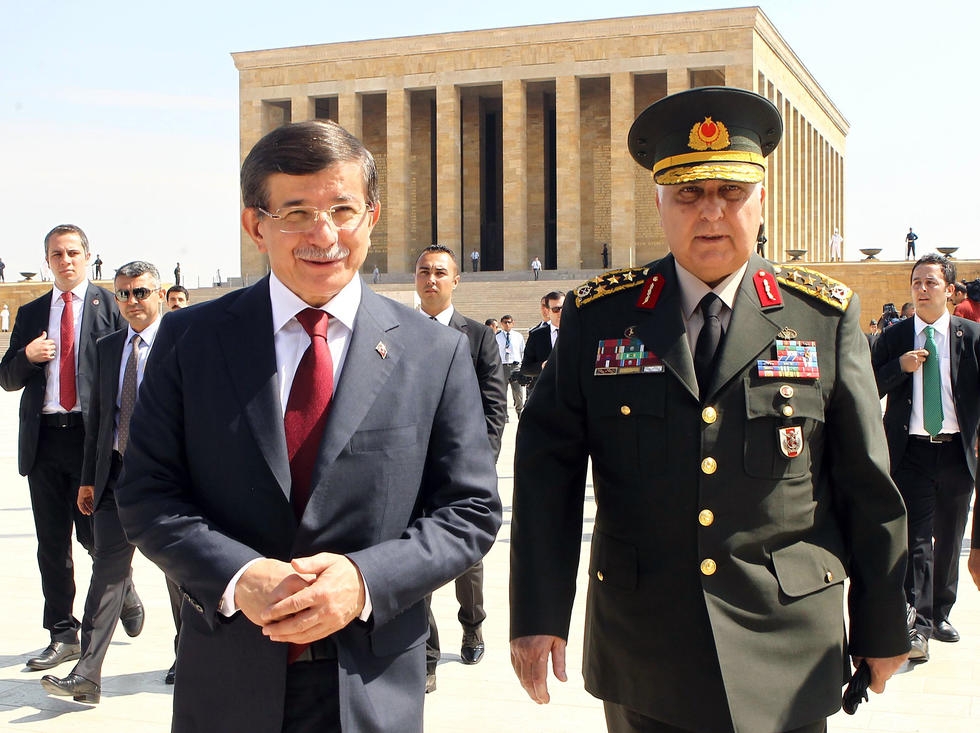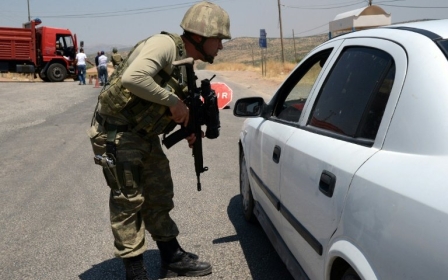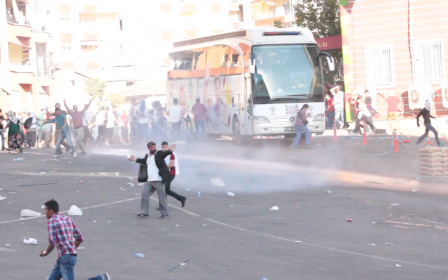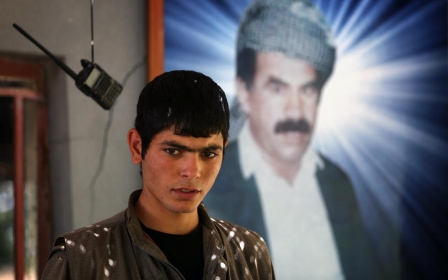A provisional Turkish government waging two wars simultaneously

On 21 July, the southern Turkish city of Suruc witnessed a suicide bombing that claimed the lives of scores and wounded many more. Almost all the victims were Kurdish, Syrian and Turkish activists. The target was a conference hosting human rights and civil society groups. Turkish officials held the Islamic State organisation (IS) responsible for the suicide attack. If so, this would be the first terror act carried out by IS in the Turkish territories.
During the week that preceded the Suruc bombing, the towns and villages in the east and southeast of Turkey, which are inhabited by a majority of Kurds, witnessed - for the first time since the start of the Kurdish peace process in March 2013 - a series of attacks claimed to have been perpetrated by the Kurdish Workers Party (PKK) or individuals sympathetic to the group.
The attacks targeted army patrols and police and security premises, as well as the bombing of the gas pipeline extending from Iran to Turkey. By the beginning of August, the PKK operations claimed the lives of no less than 25 persons from within the Turkish army, the police and the civilian population.
By the end of July, statements made by senior Turkish officials, including the president of the republic and the prime minister, were clear about the determination of the Turkish state to confront both the IS and PKK.
Ankara announced reaching a deal allowing the United States airforce to use the Incirlik base in the campaign against IS, and Turkey's plan to join this campaign. In exchange, the United States was to take Turkey's concerns in Syria into consideration. The extensive raids waged by Turkish air force planes on positions belonging to the PKK gave an indication of Turkey's zero-tolerance policy in dealing with the dual threat of terrorism emanating from IS and the PKK.
In other words, Turkey is now officially at war with the IS and PKK at the same time. Two major dangers threaten Turkey in this war. The first emanates from the ability of both IS and the PKK to carry out terror activities within Turkish borders. Although the PKK camps are located on the Iraqi Kurdish side of the Qandil mountains, the party has refused since the beginning of the peace process to disclose the hideouts of its weapons or to withdraw its units that are spread across the Kurdish population majority regions of Turkey.
And although Syria and Iraq are the main spheres of activity for the operations of the IS organisation, it is estimated that hundreds of young Turks (who happen to be mostly Kurdish) joined the organisation during the past few years. It is not usually difficult for these elements to return to Turkey from the Syrian and Iraqi combat fronts. The perpetrator of the Suruc city bombing was himself a Kurdish Turk affiliate of the IS organisation.
The second danger that threatens Turkey at this critical juncture is related to the fact that the present Turkish government, which is headed by Ahmet Davutoglu, is a provisional, caretaker government. It is not a stable government with a parliamentary majority. In short, the country is going through a phase in which a caretaker government has to make big decisions such as the decision of war and peace.
At any rate, such simultaneity between the crisis of governance, on the one hand, and the sudden escalation in the confrontation with the IS organisation and the PKK, on the other, has led to the emergence of a reading that considers war to be in fact the choice of the ruling party, especially that of President Erdogan and those who support him, who seek to frustrate the ongoing coalition government negotiations and send the country down the road of an early election.
In other words, influential leaders inside the Justice and Development Party believe that the war climate, notwithstanding all the dangers of war, would be conducive to the success of the party in securing a parliamentary majority in an early election and its return to rule in a single-party government. Such a reading is incorrect.
It is no secret that Turkey supports the Syrian revolution and that some of the revolution factions managed during the past few months to achieve tangible progress in the north of Syria.
Despite the enormous pressures to which Ankara has been subjected since the United States and its allies began their aerial bombardment against the IS organisation, Turkey stayed away from this campaign; first, because it did not deem it as serving any of its interest to go to war with the IS organisation, which is seen by Ankara as a product of the Assad regime and its war against his people, and secondly, because the Obama administration did not meet Ankara's demand that the confrontation with the IS organisation should be part of a more comprehensive strategy in Syria including the establishment of safe havens in the north of Syria.
Formally, it does seem that the IS organisation in both Syria and Iraq is under a single command (and a single Caliph). However, there are indications that matters are not like that at all, and that those who lead the organisation in Syria are a much more radical and nihilistic groups than their counterparts in Iraq, and that they are mostly non-Syrians. Evidently, they do not take into consideration the reckonings of the battle raging inside Syria and its strategic conditions.
The IS organisation in Syria has waged most of its battles against the other revolutionary groups and has made most of its gains on the ground from these battles rather than from confronting the forces of Assad and his regime. When the balance of war started tilting during the recent months in favour of the Syrian revolutionaries, the IS organisation went on stabbing the revolutionary groups allied with Turkey in the back. The operation of Suruc is nothing but another round, more stupid and more nihilistic, in an unjustifiable and incomprehensible escalation carried out by the IS organisation against Turkey and against its Syrian allies.
The PKK is, of course, another story altogether. Since the start of the peace process, the Turkish government pledged to legislate a package of laws that have fulfilled many of the cultural and linguistic Kurdish demands and made earnest strides along the path of recognising the existence of a Kurdish identity, of bolstering political liberties and of adopting unprecedented development programmes in the southeastern parts of the country.
The commitment of Ahmet Davutoglu's government to the peace process is no less, if not more, than that of the Erdogan government, which initiated the peace process. This is well known to the Kurdish leaders in Turkey and in the Qandil Mountain. This is what makes the return of the PKK to terrorist activities incomprehensible and unjustifiable.
Some Turkish commentators imagined that the party leaders in Qandil Mountain wanted to pressure the government of Ahmet Davutoglu in order to make quick gains. Such an analysis does not stand on solid ground. Kurds, just as others, realise that the Davutoglu government is a caretaker government that is unable to take major decisions or make new legislations relating to the peace process.
The more logical analysis is that the success of the Kurdish Democratic Peoples Party (HDP) in the elections stirred up the concerns of the PKK leadership in Qandil Mountain that the HDP leaders might pull the rug from underneath their feet. The PKK leadership resorted to armed struggle in order to undermine the peace process, even if just momentarily, and send a clear message to whoever it may concern that the future of the process is dependent upon the decision of the mountain leadership and not their elected comrades of the HDP. Besides, there are a number of indications that the Iranians, who maintain close links with some wings within the PKK, have encouraged the return of the party to military action in the hope that this might confuse the Turkish policy in the region.
All this, however, does not have a direct bearing on the success or failure of the ongoing negotiations between the Justice and Development Party (AKP), on the one hand, and the Republican People's Party (CHP) and the Nationalist Movement, on the other, for the forming of a coalition government. Sources linked to the negotiators from the three parties say that hopes that a coalition might be forged between the AKP and the Nationalist Movement are receding, and that the prospects of a coalition between the AKP and the CHP are lingering in the middle.
The factor that may lead to the failure of the latter is the insistence of the CHP on effecting major changes in the Turkish foreign policy vis-a-vis Syria, Egypt and the mashriq as a whole. Such a change would be unacceptable to the AKP, which would be expected to reject it just as it rejected the demand by the Nationalist Movement to stop the Kurdish peace process.
To sum up, the prospects of the emergence of a national coalition government, or heading toward an early election, is very much linked to strategic political issues in the positions of the parties involved. These issues precede the escalation in the confrontation with the IS organisation and with the PKK.
- Basheer Nafi is a Senior Research Fellow at Al Jazeera Centre for Studies.
The views expressed in this article belong to the author and do not necessarily reflect the editorial policy of Middle East Eye.
Photo: Turkey's Prime Minister Ahmet Davutoglu (L) and Turkish Military Chief of Staff General Necdet Ozel attend a ceremony at Anitkabir, the mausoleum of the founding father of modern Turkey Mustafa Kemal Ataturk, in Ankara on August 3, 2015. (AFP)
New MEE newsletter: Jerusalem Dispatch
Sign up to get the latest insights and analysis on Israel-Palestine, alongside Turkey Unpacked and other MEE newsletters
Middle East Eye delivers independent and unrivalled coverage and analysis of the Middle East, North Africa and beyond. To learn more about republishing this content and the associated fees, please fill out this form. More about MEE can be found here.





